Rising Brazil: The Choices Of A New Global Power
What should we expect from a newly powerful Brazil? Does the country have the capacity and leadership to be a central actor in addressing critical global and regional problems?
This post is also available in: Español Português
To promote the adoption of better public policies that promote childhood development, the Regional Agenda for Early Childhood Development was signed in Bogotá in November 2017. The Agenda, signed by 22 representatives of different sectors from 11 countries, defines four areas in which participants agree to prioritize their efforts: (1) Multi-sector planning and financing, (2) Improving the quality of ECD services, (3) Measuring early childhood development, and (4) Collaboration and alliance-building.
To measure countries' progress towards meeting these agreements, the Inter-American Dialogue is coordinating the production of a series of Early Childhood Development Policies Reports in different countries. The reports, which are prepared independently by civil society organizations in each country, will measure progress in specific common areas and report on advances and challenges in early childhood policies at the national level.
A central challenge in Brazil is promoting complementary, multi-sector planning of policies and services for the care and development of the 20 million children who are in early childhood.
Below is the Progress Report on Early Childhood Policy in Brazil, prepared by the Fundação Maria Cecília Souto Vidigal. The preparation of this report was supported by public officials and civil society representatives. The data collection and interviews were followed by a workshop day of collective reflection and consolidation with six representatives. This report seeks to reflect the views of the various sectors.
In recent years, early childhood development has become increasingly relevant and present on the Brazilian public agenda, with legal and institutional initiatives as well as recent programs and services that have incorporated childhood development as a priority. However, measures need to be put in place in order achieve an effective integration of governance structure and implementation capacity. The goal is to ensure cross-sectoral coordination by putting forward a comprehensive measuring and monitoring system that advances early childhood care. The creation of the National Agreement for Early Childhood can be a breakthrough in that regard.
SOME KEY MESSAGES:
Multi-sector planning and financing: Although Brazil has a robust legal framework aligned with scientific evidence, sector-specific plans, and programs for early childhood care, the stated goals still focus on expanding access and supply national cross-sectoral committee conditions. Brazil has tried several coordination systems; a was set up in March 2017, but in practice its articulation power is limited. Various factors in the structure of public administration necessitate an adaptable, holistic approach to implementing public policies through sectoral initiatives. Monitoring total investment in early childhood in Brazil is a major challenge because the education budget structure does not differentiate by age group. As for the financial aspect, there is no estimate of national investment in public policies for early childhood.
Improving the quality of ECD services: Although there is no consolidated system in Brazil that guarantees the quality of services for early childhood, there are sector-specific, defined standards that are fundamental elements for the creation of a monitoring structure. The challenge is to consolidate reference documents and quality parameters of services in order to create a single system of records from the three main ministries responsible for policies for child development. This would form the basis for a system for monitoring and controlling policies and their associated services.
Measuring early childhood development: In Brazil, there are no goals or systems for periodic evaluation of comprehensive development in early childhood. National targets and monitoring statistics are limited to: access to services, the existence of supplies, and more specific initiatives. However, according to two recent studies, there have been some advances in this regard. National Research for Home Sampling (PNAD) and Social Indicator synthesis (SIS) have relevant information on childcare and education but does not have a fixed reoccurring schedule or guaranteed funding. There are other measuring instruments adapted to Brazilian reality; the challenge is to design a system based on these various existing initiatives that provides cross-sectoral and periodic measurement, monitoring, and evaluation.
Collaboration and alliance-building: Brazilian legislation already provides for the existence of sectoral and child rights councils composed of members of civil society and the public. The National Early Childhood Network - formed in 2007 and which numbers more than 200 members - is the coalition with the greatest capacity to impact public policies for early childhood. Additional measures are still needed to lead to effective integration and consolidate an implementation-capable governance structure that ensures cross-sectoral action.
Follow our report online: #PrimeraInfanciaBrasil, #desenvolvimentoinfantil and #politicapublica
What should we expect from a newly powerful Brazil? Does the country have the capacity and leadership to be a central actor in addressing critical global and regional problems?
President Lula da Silva triumphantly announced that he and his Turkish counterpart had persuaded Iran to shift a major part of its uranium enrichment program overseas—an objective that had previously eluded the US and other world powers. Washington, however, was not applauding.
An upcoming meeting between Presidents Obama and Rousseff should not be expected to produce dramatic news or unexpected major breakthroughs.
